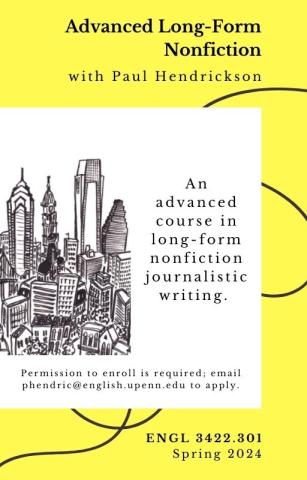An advanced course in long-form nonfiction journalistic writing for a select group of experienced and self-starting student writers. (Ideally, each accepted member will have already taken one or two nonfiction seminars within the creative writing program.) The goal will be to tailor a reporting and writing project to your interest, one you may have long wished to take up but never had the opportunity. It could be a project in the arts. It could be a profile of a person or place. It might be documentary in nature, which is to say an extremely close-up observation of your subject. (An example: think of a hospital chaplain at Penn, going on his dreary, redemptive, daily rounds, to visit the sick and anoint the dying. What if you were there, for most of the term, as unobtrusively as possible, at his black-clad elbow?) The group will meet at to-be-determined intervals. In between, the enrollees will be pairing off and in effect serving as each other’s editor and coach and fellow (sister) struggler. When we do assemble as a group, we will be reading to each other as well as discussing the works of some long-form heroes—Didion, Talese, Richard Ben Cramer, one or two others you may not have heard of. In essence, this is a kind of master course, limited in enrollment, and devoted to your piece of writing, to be handed in on the final day. It will be in the range of 25 to 30 pages, something above 8,000 words. The course presumes a lot of individual initiative and self-reliance. Permission to enroll is required. If you’re interested, please email phendric@english.upenn.edu and suggest your qualifications.
Syllabus:
An advanced course in long-form nonfiction journalistic writing for a select group of experienced and self-starting writers. (Ideally, each accepted member will have already taken one or two nonfiction seminars within the creative writing program.) The goal will be to tailor a reporting and writing project to your interest, one you may have long wished to take up but never had the opportunity. It could be a project in the arts. It could be a profile of a person or place. It might be documentary in nature, which is to say an extremely close-up observation of your subject. (An example: think of a hospital chaplain at Penn, going on his dreary, redemptive, daily rounds, to visit the sick and anoint the dying— and you are right there, hanging sensitively at his elbow.)
Except stop right there. That last suggestion—taken up in previous classes, and, at least once, resulting in a magisterial effort by the end of the term—may not be viable in the spring of 2024, due to lingering effects of Covid. I am still hedging the reporting bets a little on how all this will go, as we continue to stare down the emotional and psychological effects of what is now a nearly four-year pandemic ordeal. In 2022 and 2023, we were able to get out and do some real “in-field” reporting, even if the bulk of the field was located within the campus gates. (There were several projects that went out into the city, guardedly.) We will just have to play it as it lays.
One way or another, you will find your reporting and writing project. The instructor guarantees it. And indeed I will be talking with you on the phone or even in person before the term begins, to brainstorm reporting ideas.
In essence, this is a kind of master course, devoted primarily to your piece of writing, to be handed in on the final day. It will be in the range of 25 to 30 pages, about 8,000 words. The course presumes a lot of individual initiative and self-reliance. That is part of the experience.
Note: we will come together at times to be announced—most probably in the evening, over the dinner hour, with food provided by the instructor.
In between, you will be pairing off with someone else in the class and in effect serving as each other’s editor and coach and fellow (sister) struggler. When we do assemble as a group, we will be reading to each other as well as discussing some beautiful nonfiction—from Joan Didion and Richard Ben Cramer George Orwell and some others you may not have read or heard of—but whose work will knock you flat.
Some specifics: About a month into the term, the first very rough (and brief) looks will be due: scene, sketch, captured moments of the work-in-progress. Really, a couple of pages. In other words: something. It will be relieving: just to have gotten this much on paper. We’ll look at several of these raw pages in class and discuss them as a group. This will be a way of finding your piece’s eventual form as well as my making sure that all of you are working at a level of continual intensity.
Right after break, a second look due, bit longer than the first, and, again, we will read and discuss in class as many of these pages as we can. Mid-April, the third looks will be due.
I will be looking closely at your work-in-progress as we go along, and your fellow editor-coach-scribbler will be doing that as well.
Last year, Omnia magazine at the university did a feature on the class, and on the projects that were taken on in the spring of 2022 class. You might want to look at this piece, because it represented well the heart of what the class is attempting to achieve: https://omnia.sas.upenn.edu/story/moments-time
If you’re interested in the class, please email phendric@english.upenn.edu and suggest your qualifications. Permission to enroll is required. Thank you.

 Department of English
Department of English
